An idiot, I’ve no idea who, bought me a Beatles jigsaw for Fathers Day.
I open the box and find some dopey clot had torn up the picture….

…..into tiny shaped pieces…
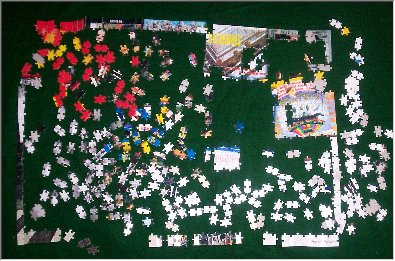
…and I am expected to put it together again.
We chess players create things, not repair the work of vandals.
This is dustbin fodder.
Why could I not get a pair of Beatles socks like all the other fathers
will be wearing till they get washed and one disappears.
(I have a theory that one sock eats the other, hence the reason why every
household has a pile of ½ a pair of socks.)

Remember the last blog and this position: Black to play.
Black missed 23…Qf3! stopping the mating threats.
The Scottish International player Graham Morrison alerted me to the
fact that this position was used by Jacob Aagaard in his book:
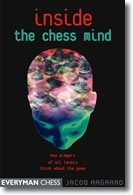
Where the 23…Qf3 game was used as one of the test positions for the
GM’s, IM’s and others to solve.
The book gives diverse positions and players of varying strengths supply their
thoughts on how they approached the position and give their analysis.
I do not have a copy and was wondering who was first to spot the 23…Qf3 shot?
Black missed it in 1953
The judges of the brilliancy prize missed it.
The lad who put into the 1954 Chess Review missed it.
I can find nobody coming on in a later issue of Chess Review
saying they saw it.
Fred Reinfeld missed it when he wrote:
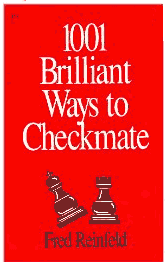
The diagram above is listed with the following wrong solution.
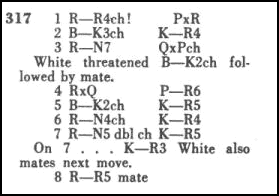
(perhaps we should call it 1001 -1 Brilliant Checkmates.)
….and I missed it in 2011. 🙂
I knew Fred missed it because Jacob Aagaard got in touch and told me
he himself spotted the flaw when reading Fred’s book and solving the puzzles.
Now I know some of you reading this, and the previous blog, have this book because
I have seen it mentioned in the forums when other players are giving out
advice on what books to buy.
Thankfully I don’t have the book else it would have been a double whammy,
I lifted the pictures including the solution from the net.
Link to 1001 Brilliant Checkmates.
You can see the first 30 odd positions and then all the solutions.
(I had to skim through all the solutions looking for the right one to post here.)
I recall in the past some lad saying he had a PGN file of the positions from
this book but no solutions and I replied saying you don’t need the solutions if
you have solved it and you are looking at a checkmate.
So today’s’ lesson is:
It is not enough to own a chess book.
You have to read it, study it and question it.
A perfect example of not believing everything you see.
That is possibly one reason why we are stuck in the swamp and sinking
whilst Grandmasters like Jacob Aagaard are sailing free.
I lifted position 29 from the above link.
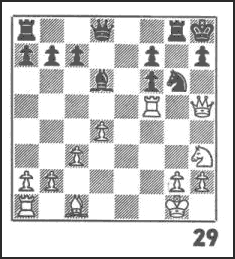
White to play and mate in a few.
Fairly straight forward, it’s all done with check.
It did not take long to find a candidate game from RHP featuring a Qxh7+ sac
angelo84 - caoimho RHP 2009
I open the box and find some dopey clot had torn up the picture….

…..into tiny shaped pieces…

…and I am expected to put it together again.
We chess players create things, not repair the work of vandals.
This is dustbin fodder.
Why could I not get a pair of Beatles socks like all the other fathers
will be wearing till they get washed and one disappears.
(I have a theory that one sock eats the other, hence the reason why every
household has a pile of ½ a pair of socks.)

Remember the last blog and this position: Black to play.
Black missed 23…Qf3! stopping the mating threats.
The Scottish International player Graham Morrison alerted me to the
fact that this position was used by Jacob Aagaard in his book:

Where the 23…Qf3 game was used as one of the test positions for the
GM’s, IM’s and others to solve.
The book gives diverse positions and players of varying strengths supply their
thoughts on how they approached the position and give their analysis.
I do not have a copy and was wondering who was first to spot the 23…Qf3 shot?
Black missed it in 1953
The judges of the brilliancy prize missed it.
The lad who put into the 1954 Chess Review missed it.
I can find nobody coming on in a later issue of Chess Review
saying they saw it.
Fred Reinfeld missed it when he wrote:

The diagram above is listed with the following wrong solution.

(perhaps we should call it 1001 -1 Brilliant Checkmates.)
….and I missed it in 2011. 🙂
I knew Fred missed it because Jacob Aagaard got in touch and told me
he himself spotted the flaw when reading Fred’s book and solving the puzzles.
Now I know some of you reading this, and the previous blog, have this book because
I have seen it mentioned in the forums when other players are giving out
advice on what books to buy.
Thankfully I don’t have the book else it would have been a double whammy,
I lifted the pictures including the solution from the net.
Link to 1001 Brilliant Checkmates.
You can see the first 30 odd positions and then all the solutions.
(I had to skim through all the solutions looking for the right one to post here.)
I recall in the past some lad saying he had a PGN file of the positions from
this book but no solutions and I replied saying you don’t need the solutions if
you have solved it and you are looking at a checkmate.
So today’s’ lesson is:
It is not enough to own a chess book.
You have to read it, study it and question it.
A perfect example of not believing everything you see.
That is possibly one reason why we are stuck in the swamp and sinking
whilst Grandmasters like Jacob Aagaard are sailing free.
I lifted position 29 from the above link.

White to play and mate in a few.
Fairly straight forward, it’s all done with check.
It did not take long to find a candidate game from RHP featuring a Qxh7+ sac
angelo84 - caoimho RHP 2009

